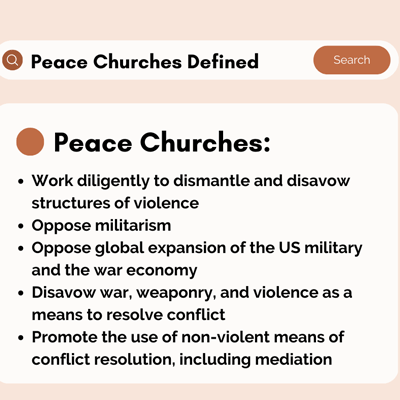Focus of webinar is how to define and discern one’s way to becoming a Peace Church
by Scott O’Neill | Presbyterian News Service

Photo by Milada Vigerova via Unsplash
LOUISVILLE — The Presbyterian Mission Agency’s Militarism Working Group held its first Connecting the Dots webinar in 2023 on Wednesday, discussing what it means to be a Peace Church within the Presbyterian Church (U.S.A.). Moderator Ben Daniel, pastor at Montclair Presbyterian Church in Oakland, California, opened the session by noting that talking about what it means to be a Christian in a time of war is an important conversation to have.
Tongue in cheek, Daniel shared his personal experience with a “brilliant” sermon he preached to his congregation back in 2003 opposing the invasion of Iraq by U.S. forces. He came to realize after the fact that his timing was poor.
“In the fallout of that experience, I realized that regardless of how good the sermon was, it was too late for me to start talking about the war when our country was already at war. So, I am glad we are having this conversation whether or not your congregation decides it wants to be a Peace Church or you’re just here to listen and share,” said Daniel. “Let’s start having these conversations while our country is not formally at war.”
Watch the entire discussion by clicking below:
Mark Davidson, pastor emeritus at the Church of the Reconciliation in the Presbytery of New Hope in North Carolina, provided background on the denomination’s discernment process between 2010 and 2016, which spanned three General Assemblies beginning in 2012. In 2018, commissioners approved an overture to recognize and commend those churches who had declared themselves Peace Churches. He offered a partial definition of what a Peace Church is:

A more thorough description of Peace Churches can be found here.
Marilyn White, a ruling elder at Faith Presbyterian Church in Austin, Texas, shared her congregation’s journey to becoming a Peace Church, noting that the church did not have a curriculum to follow like there is currently.
“We were kind of on our own, but we emphasized sharing personal beliefs about militarism and nonviolence. Our goal was to create our own statement of what we believe and then see if that made us a Peace Church or perhaps something else,” said White.
Daniel also shared his congregation’s experience becoming a Peace Church, which began in 2016 and culminated on Sunday, November 11, 2018, marking the 100th anniversary of the end of WWI.
“It took us two years of really rich conversations and I’m grateful those remain important discussions,” said Daniel. “I don’t think we (as a congregation) are 100% in agreement and have members who just see things differently. The idea of being a Peace Church is a living thing for us. The conversation did not stop in 2018.”
Before delving into a Q&A session from participants, Geoff Browning, a retired campus pastor and parish associate at First Presbyterian Church in Palo Alto, California, shared a survey he developed called the Inventory of Conscience. According to Browning, the survey was an outgrowth from confirmation classes for young people.
“As young people going through confirmation class, talking about Jesus, nonviolence and justice are all concerns. But how can we really know what we believe about the use of violence if nobody has done anything to help us discern?” asked Browning.
Through the Inventory of Conscience process, about six young people have declared themselves conscientious objectors in the PC(USA).
“This is not a process whereby we force them (young people) to believe one thing or another,” said Browning. “It’s to help them identify what they believe and encourage them to follow their conscience.”
The Connecting the Dots webinar series examines militarism from a variety of perspectives through a lens of Christian faith. Prior webinars have covered topics such as national security in Colombia and Korea, gun violence, violent conflict and climate change, and militarism and moral injury. Future webinar topics include Colombia and Militarism and The Economy.
Previously recorded sessions can be viewed on the Connecting the Dots webpage.
The Presbyterian Mission Agency’s Militarism Working Group includes the Compassion, Peace & Justice and World Mission ministries and the Presbyterian Peace Fellowship.
![]() You may freely reuse and distribute this article in its entirety for non-commercial purposes in any medium. Please include author attribution, photography credits, and a link to the original article. This work is licensed under a Creative Commons Attribution-NonCommercial-NoDeratives 4.0 International License.
You may freely reuse and distribute this article in its entirety for non-commercial purposes in any medium. Please include author attribution, photography credits, and a link to the original article. This work is licensed under a Creative Commons Attribution-NonCommercial-NoDeratives 4.0 International License.
Categories: Peace & Justice, World Mission
Tags: ben daniel, church of the reconciliation, compassion peace & justice, connecting the dots, faith presbyterian church austin texas, first presbyterian church palo alto california, marilyn white, mark davidson, militarism working group, montclair presbyterian church oakland california, peace church, presbyterian peace fellowship, presbytery of new hope, rev. geoff browning, world mission
Ministries: Compassion, Peace and Justice, World Mission